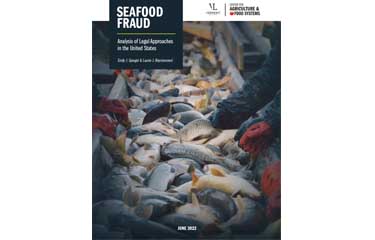Seafood fraud is widespread throughout the United States, but there are some solutions to the issue, according to a new report.
Studies have shown between 16 and 75 percent of U.S. seafood is mislabeled, Vermont Law School’s Center for Agriculture and Food Systems (CAFS) said in its Seafood Fraud: Analysis of Legal Approaches in the United States report.
“While domestic fisheries are regulated, the international supply chains from which 80 percent of U.S. seafood originates, are difficult to monitor and complicate efforts to enforce regulations,” the report said.
As a result, the international seafood trade has come “increasingly under fire in recent years,” with legislation introduced in the U.S. House and Senate to expand regulatory rules, CAFS said in a press release.
"There are many opportunities for individuals and entities to engage in seafood fraud throughout the supply chain. Because so much of U.S. seafood is imported, the product moves through various countries and regulatory networks by the time it gets to our markets,” said CAFS Professor of law and Co-lead Author of the report Emily Spiegel. “The issues in this industry are global, and the lessons we glean from examining the American legal approach are also relevant in other countries with similar regulatory challenges.”
There is no single authority for regulating seafood in the U.S., Spiegel said.
“Instead, an overlapping patchwork of laws and regulations covering issues such as conservation, food safety, and consumer protections attempt to close gaps in traceability, adulteration, mislabeling, and other issues. This piecemeal approach often leads to duplicate efforts and oversights,” CAFS said.
The report provides several policy actions for states and countries seeking to enhance seafood fraud regulation, including developing a legal definition of seafood fraud to allow for a coordinated means of addressing the problem; Preventing and detecting fraud, including targeting co-occurring maritime crimes, and adding more stringent fishing vessel registrations and effective whistleblower laws; Enforcing existing laws by designating specific agencies responsible for enforcement and imposing penalties as a deterrent; and increasing coordination to monitor and document complex supply chains.
The report was funded in part by the U.S. Department of Agriculture National Agricultural Library, with support from the United Nations Food and Agriculture Organization (FAO).
“Mitigating seafood fraud within the U.S. is a complicated and multifaceted issue. Not only does seafood fraud erode consumer trust in the market, but it also threatens public health, food safety, and the conservation of the natural resources it is closely tied to,” CAFS Director Laurie Beyranevand said. Beyranevand also co-authored the report.







